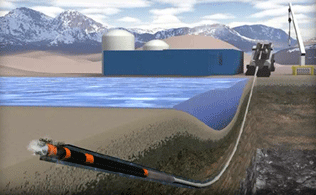How Do HDD Contractors Deal with Groundwater During Drilling?
Are you curious about how horizontal directional drilling (HDD) tackles the challenge of groundwater? Groundwater can pose significant obstacles during drilling operations, but HDD contractors are well-equipped with strategies and technologies to manage this issue effectively.
Today, here in this blog post, we will explore the innovative approaches used by HDD contractors to ensure successful drilling outcomes while safeguarding groundwater resources.
So, let’s get started to learn more.
Understanding the Importance of Groundwater Management
Groundwater serves as an indispensable natural resource, acting as the primary source of drinking water for numerous communities worldwide. Its availability and purity are crucial for the health and well-being of millions of people.
However, during construction and infrastructure development, particularly in drilling operations, groundwater is highly susceptible to contamination and physical disruption. The process of drilling, essential for laying utilities and pipelines, can introduce pollutants such as chemicals and sediments into groundwater systems.
Additionally, the mechanical disturbances can alter the natural flow of water, potentially leading to depletion or redirection of water sources that communities depend on. Hence, the effective management of groundwater is not merely a technical challenge; it is also a critical legal obligation.
Regulatory frameworks are designed to ensure that entities, including HDD contractors, adhere to stringent environmental protection standards. These regulations are intended to safeguard public health and preserve the quality and availability of this vital resource, making responsible groundwater management a foundational aspect of ethical and compliant construction practices.
The Role of HDD in Groundwater Management
Horizontal directional drilling is favored in many projects due to its minimal environmental impact compared to traditional drilling methods. HDD is often employed to install pipelines and other utilities beneath water bodies and densely populated areas where minimizing disturbance to groundwater is paramount.
Pre-Drilling Assessments
Site Investigation:
Before an HDD project commences, a meticulous site investigation is paramount. This initial step involves hydrogeological mapping, a process crucial for delineating groundwater flow patterns and determining aquifer depths. Such detailed understanding of the aquifer characteristics is indispensable, as it guides the strategic planning of the drilling path. This careful routing is aimed at either completely avoiding aquifers or, at the very least, minimizing any disturbance to these critical groundwater layers. Effective planning at this stage is vital to mitigate environmental risks and ensure the project’s alignment with sustainable practices.
Environmental Impact Assessments (EIA):
Environmental Impact Assessments (EIA) are crucial regulatory requirements that HDD contractors must fulfill prior to initiating any drilling activities. These assessments are designed to forecast the potential impacts of the project on local water sources, providing a predictive outlook on environmental repercussions. The insights gained from EIAs are instrumental in formulating robust strategies to mitigate any detrimental effects on groundwater. By identifying potential risks early, contractors can implement specific measures tailored to protect water quality and maintain ecological balance throughout the drilling process.
Innovative Drilling Techniques
Using Non-Invasive Drilling Fluids:
HDD contractors utilize specially formulated drilling fluids, primarily composed of bentonite or polymers, which are both non-toxic and biodegradable. These fluids are crucial in maintaining the structural integrity of the borehole, managing the subterranean pressure effectively, and safeguarding against groundwater contamination. Their application ensures minimal environmental impact while facilitating the smooth execution of drilling operations.
Precision Drilling:
HDD contractors employ advanced guidance systems to navigate the drill bit with exceptional precision. Utilizing GPS and real-time monitoring technologies, these systems enable the dynamic adjustment of the drilling path. This capability is vital for strategically avoiding aquifers and maintaining a requisite distance from vital groundwater sources, thereby preventing any potential water contamination and ensuring the protection of underground water reserves.
Contingency Planning
1. Spill Prevention Plans:
Contractors develop comprehensive spill prevention plans to handle potential leaks of drilling fluids or other hazardous materials. These plans include measures for immediate containment and remediation to protect groundwater.
2. Emergency Response Strategies:
In the event of an accidental breach into an aquifer, HDD contractors are prepared with emergency response strategies. These may involve the use of barrier systems to isolate the contamination and techniques to quickly seal off water pathways.
Post-Drilling Groundwater Monitoring
After the completion of drilling, contractors don’t just pack up and leave. Post-drilling monitoring is crucial to ensure that groundwater has not been adversely affected by the project.
1. Water Quality Testing:
Regular sampling and testing of groundwater around the drilling site are conducted to detect any potential contamination. This also helps in assessing the effectiveness of the mitigation strategies employed during drilling.
2. Long-Term Monitoring Programs:
Long-term monitoring programs are established to continuously assess the health of groundwater. Any signs of long-term impacts from the drilling operation are addressed promptly to prevent lasting environmental damage.
Community Engagement and Transparency
HDD contractors recognize the importance of maintaining open lines of communication with local communities and stakeholders. Regular updates on drilling progress and findings from environmental monitoring are shared with the public. This transparency helps build trust and ensures that community concerns regarding groundwater are addressed.
The Concluding Notes
Effective management of groundwater during HDD operations involves a combination of careful planning, advanced technology, and ongoing monitoring. HDD contractors are at the forefront of adopting these practices to ensure that drilling projects are safe, compliant, and environmentally responsible. By prioritizing the protection of groundwater, HDD contractors not only comply with regulatory demands but also contribute to the sustainable management of our natural resources.
This deep dive into how HDD contractors manage groundwater challenges during drilling should provide you with a clear understanding of the intricate balance between development and environmental stewardship in modern construction practices.



.jpg)


Comments
Post a Comment